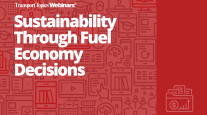Inflation, Rising Fuel Costs, May Impede Fleets’ Profit
This story appears in the May 2 print edition of Transport Topics.
Rising inflation, whether fuel, food and other basic consumer prices, or the costs of running trucking firms, presents a danger of crimping fleet profit increases this year, transportation analysts said.
The Department of Labor reported last month that consumer prices increased 0.5% in March, a rate that would be 6% a year if it continued. Gasoline and food prices accounted for most of the increase, with the DOL’s gasoline index showing a 14.4% jump over the past three months.
While Federal Reserve Chairman Ben Bernanke said last week that the increase was “transitory” and would subside by fall, Bob Costello, chief economist and vice president of American Trucking Associations, said that the higher cost of doing business in trucking was, for now, more severe than general inflation.
“First, inflation is higher for motor carriers than the general public,” Costello told Transport Topics. “Fuel, driver wages, health insurance, tires, equipment . . . are increasing faster than general retail prices for households.”
However, Costello also said consumer inflation was always a concern.
“But I don’t think, at this juncture, inflation will get out of control without wage inflation,” he explained. “Wages are just returning to pre-recession levels. Additionally, there are more than 13 million people still unemployed. . . . It is difficult for wages to accelerate too much with that many people still unemployed.”
He acknowledged, however, that “if people are spending more to buy the same amount of food and gas, that is less money they have to buy other ‘stuff,’ and . . . trucking hauls the vast majority of that other ‘stuff.’ ”
Analysts said rising fuel prices could sap consumer confidence and spending.
Chris Brady, president of Commercial Motor Vehicle Consulting, Manhasset, N.Y., said that falling consumer confidence and flat or dropping disposable income could cut trucking volumes this summer.
A New York Times/CBS News national poll in late April showed the sapping of consumer confidence.
“Amid rising gas prices, stubborn unemployment and a cacophonous debate in Washington over the federal government’s ability to meet its future obligations, the poll presents stark evidence that the slow, if unsteady, gains in public confidence earlier this year that a recovery was under way are now all but gone,” the Times reported April 21.
“Rising food and energy prices will cause households to adjust spending on non-energy and food products, since households’ balance sheets remain relatively weak,” Brady told TT.
“Retail sales in the second quarter will be below retailers’ expectations, causing inventories to increase above plan, which will result in a moderate inventory correction during the second quarter and into the third quarter,” Brady said. “A moderate inventory correction implies the growth rate of freight volumes will moderate during the second quarter and into the third quarter.”
Peter Nesvold, managing director and transportation equity research analyst for investment firm Jefferies & Co. in New York, remained optimistic on trucking profits but said both trucking costs and general inflation have lowered expectations.
“Most public carriers expect 3% to 5% . . . rate increases for full-year 2011 . . . net of fuel,” Nesvold told TT.
“While yields are strong, it increasingly feels like a substantial portion of that will be eaten up by increases in driver pay, which seems likely to grow by at least 5% to 10%,” he said. “Tire prices are also on the move, with reports of 8% to 10% increases becoming commonplace. Finally, the jump in fuel prices will also have some effect on earnings, because fleets can’t typically recoup all of it.”
Nesvold added that some weakening in freight volume probably has occurred already.
“It’s not clear yet that higher energy prices have started to weigh on the freight environment, although there appears to be some weakness on the West Coast,” Nesvold said.
“It’s hard to tell right now what is going on, whether the weakening on the West Coast reflects energy, low home prices or effect of Japan’s disaster,” he added. “The vast majority of transportation companies have started to slow relative to their earlier expectations. They say, ‘We’re still growing, but business is just not growing as fast as we thought it would.’ ”
Noel Perry, managing director of transportation consulting firm FTR Associates, Nashville, Ind., was also more worried about costs in trucking than about consumer inflation.
“People talk about inflation a lot, but the overall numbers don’t really change,” Perry said. “People who buy houses don’t pay what they did a few years ago, and that is real sign” [of lack of inflation].
Perry told TT that trucking costs — for labor, fuel and equipment, all of which are rising — comprise about 85% of business costs for truckload carriers. He added, however, that there are still an equipment shortage in trucking and rising freight volumes.
“I don’t expect inflation to be a significant problem for truckers in this upturn, because they will usually be able to recover their costs” by raising rates, Perry said. “It will be a problem for shippers, not truckers.”


